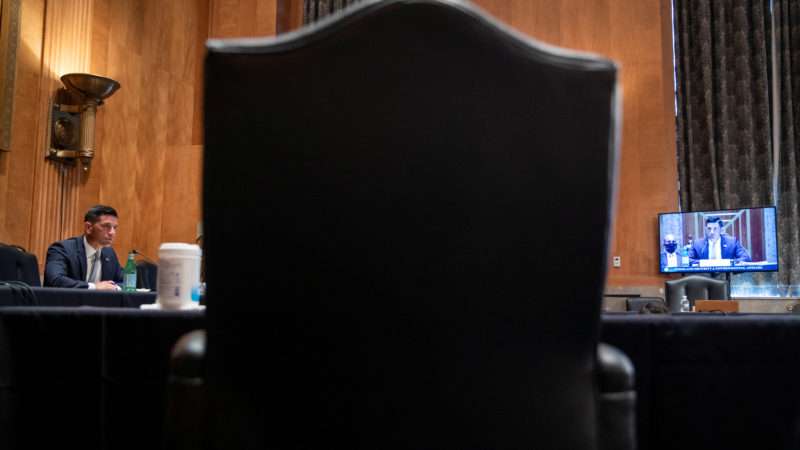
Inspectors general are the watchdogs of government, tasked with keeping government officials and their agencies honest and with detecting fraud and abuse. It’s an important position given the money and power that flows through the organs of the state and the resulting opportunities for shenanigans, great and small. So, it’s more than a little worrying when one of the watchdogs is charged with criminal abuse of his position of trust in an effort to enrich himself.
In the midst of a political climate featuring grandiose promises intended to entice voters, this scandal is a fresh reminder that ever-more expansive and expensive government programs represent irresistible temptations for sticky-fingered crooks.
The indictment of Charles K. Edwards, a former acting inspector general for the U.S. Department of Homeland Security (DHS), came down as most of the country was distracted by the prospect of viral doom. According to a March 6, 2020 U.S. Department of Justice press release:
A federal grand jury in the District of Columbia returned a 16-count indictment against a former Acting Inspector General for the U.S. Department of Homeland Security (DHS) and a former subordinate for their alleged theft of proprietary software and confidential databases from the U.S. government as part of a scheme to defraud the U.S. government…
The indictment charges Charles K. Edwards, 59, of Sandy Spring, Maryland, and Murali Yamazula Venkata, 54, of Aldie, Virginia, with conspiracy to commit theft of government property and to defraud the United States, theft of government property, wire fraud, and aggravated identity theft. The indictment also charges Venkata with destruction of records.
Edwards, who resigned from his post at DHS in 2013, had his associates copy proprietary software as well as information about internal investigations and personal identifying information on DHS and Postal Service employees. His intent, says the Justice department, was to sell an improved version of the software back to the government.
According to an internal privacy notice at DHS, the stolen data included “names, Social Security numbers, dates of birth, positions, grades, and duty stations” on 246,167 employees. The affected workers were offered 18 months of paid identity-protection services and urged to take other defensive steps, including freezing their credit.
Remember, the guy who allegedly put them in this position was the watchdog tasked “to ensure integrity and efficiency in government.” Under the 1978 law that created inspectors general, his job was, in part, “to prevent and detect fraud and abuse in, such programs and operations.”
This wasn’t the first indication that Edwards is a little shady. As the Acting Inspector General at the Department of Homeland Security from 2011 until he resigned in December 2013, Edwards was the subject of so many complaints from Office of Inspector General (OIG) staffers that he became the subject of a Senate subcommittee investigation.
Among the findings of that investigation were that “Edwards directed reports to be altered or delayed to accommodate senior DHS officials” and that he “offered updates on investigations and audits” to their subjects.
Edwards also socialized with senior DHS officials—the people he was supposed to be watching—in an apparent effort to gather support for a permanent appointment to his position. He “would boast about his close relationship with members of DHS management, how frequently he met or dined with DHS management, and that his nomination was all but assured.”
That didn’t happen. He ended up resigning and transferring to a less-responsible position at the Office of Science and Technology at DHS. And then, according the Justice Department, he used his access and connections to steal software and personal information about hundreds of thousands of people.
The problem of ensuring the trustworthiness of those tasked to keep others honest is such an old one that its most famous framing is in Latin: Quis custodiet ipsos custodes? Who watches the watchmen? The risk is that, if there’s temptation, it’s most available to whoever is at the end of the line of watchdogs.
As temptation goes, governments offer plenty. Vast amounts of money flow through its agencies, as does enormous authority, including the power to forcibly intrude into people’s lives. That has led tax collectors to commit fraud, police to cyberstalk victims through official databases, drug agents to abuse asset forfeiture powers, ATF agents to set up mentally disabled marks for arrest, and so much more in a litany of horrors.
So, inspectors general and other watchdogs have been assigned to keeping government agencies honest. But, as it turns out, that doesn’t work out so well when the watchdogs themselves can’t be trusted.
This matters at a time when the idea of limits on government is largely out of fashion, and candidates for office compete to expand the power of the state. Politicians promise a Green New Deal and federal jobs guarantees that would further entrench government control of the economy, tax-funded healthcare that would centralize personal data and the provision of medical services, and an ever-expanding state living beyond its means until the ability to borrow runs out.
Who are going to be the inspectors general of a government that promises everything to everybody and uses that as an excuse to accumulate unprecedented money and power? Are we certain they’ll be made of better stuff than the DHS’s former Acting Inspector General? And, if not, who is going to keep an eye on them?
The way things are going, the crooked watchdogs of the future will have the opportunity to make Charles K. Edwards look like a rank amateur. The only way to prevent that fate is to limit the size and power of government to keep the stakes low. That will keep the damage within reasonable limits when we inevitably run out of watchers for the watchmen.
from Latest – Reason.com https://ift.tt/36x7mFj
via IFTTT